

Business.com aims to help business owners make informed decisions to support and grow their companies. We research and recommend products and services suitable for various business types, investing thousands of hours each year in this process.
As a business, we need to generate revenue to sustain our content. We have financial relationships with some companies we cover, earning commissions when readers purchase from our partners or share information about their needs. These relationships do not dictate our advice and recommendations. Our editorial team independently evaluates and recommends products and services based on their research and expertise. Learn more about our process and partners here.


Many businesses have needs beyond basic customer relationship management (CRM) functionality and prefer a unified solution to handle accounting, order management, inventory tracking and more. Oracle NetSuite CRM is part of Oracle’s comprehensive business software suite that includes impressive enterprise resource planning (ERP) capabilities, allowing businesses to use one hub to manage many functions. Its flexible CRM software handles sales automation, marketing campaigns, reporting, commissions, partner relationship management and real-time forecasting. It also includes a CPQ module and customer success features to put a multitude of high-grade technology at your fingertips. In addition, users can easily integrate numerous native add-on modules — like feature-rich SuiteCommerce for combined B2B and B2C ecommerce management — to expand the platform’s capabilities.
9.2 / 10
Like many other providers, NetSuite CRM offers core CRM software benefits, including contact and opportunity management, sales automation, marketing campaigns, reports and sales forecasting. Additionally, users get access to quote and invoice management, as well as the ability to handle complex commissions and partner relationships.
However, what sets NetSuite CRM apart from the competition is its seamless integration with a broader suite of NetSuite’s cloud-based solutions. Thanks to the CRM’s connection to the core ERP platform, you can manage the entirety of the customer lifecycle — from lead acquisition and deal management to order fulfilment, upselling opportunities and post-purchase customer service — through one solution.
Oracle’s app marketplace is substantial, featuring hundreds of apps for a variety of business needs, from asset management to supply chain planning. It also has specialist apps for different verticals, including advertising and wholesale distribution. In addition to that, the provider offers NetSuite Connector to help integrate and map data between NetSuite and leading e-commerce, logistics and point-of-sale (POS) solutions, top marketplaces and CRM providers like Salesforce, creating a central data repository and minimizing the risks of duplicate efforts and errors caused by manual data entry.
NetSuite’s comprehensive technology collection, built-in integrations, accounting features and e-commerce functions eliminate the need for multiple platforms. You can run your entire business with this software, not just your sales, marketing and customer support departments. For these reasons and more, Oracle NetSuite CRM is our top choice for companies looking for a CRM with ERP capabilities.
To access the CRM, businesses must subscribe to the overall NetSuite platform. That puts a lot of high-grade technology at your fingertips, but it could be challenging if your business operates on a tight budget or doesn’t have an IT team to help with implementation and adoption.
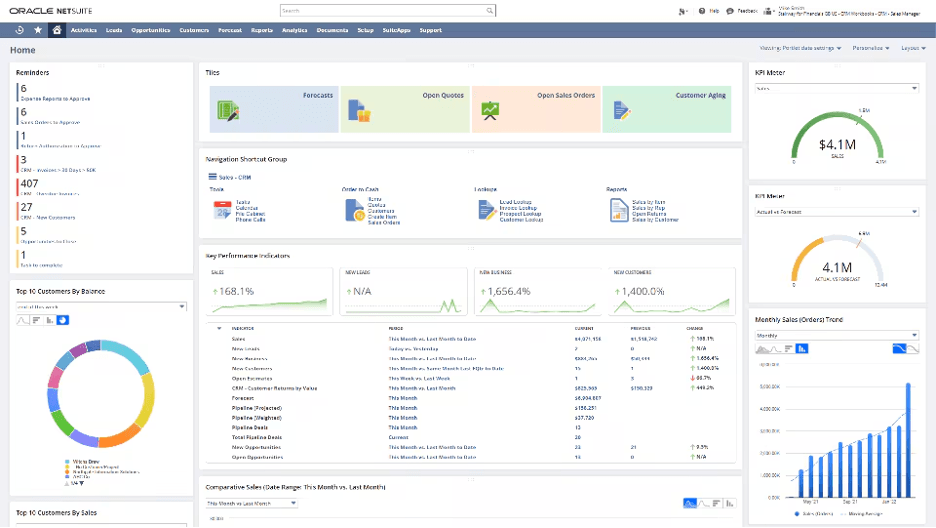
NetSuite CRM was designed as an add-on module for Oracle’s flagship ERP system. Therefore, the CRM integrates seamlessly with the Oracle NetSuite platform and works smoothly right out of the box – even though the implementation process can be lengthy, depending on your business’s size and specific needs.
For those not used to ERP platforms, the sheer number of available features can be overwhelming. However, considering that NetSuite will allow you to manage your entire business from one place, we found it relatively easy to use and adopt once the custom setup has been completed.
Here are a few ease-of-use factors we noted:
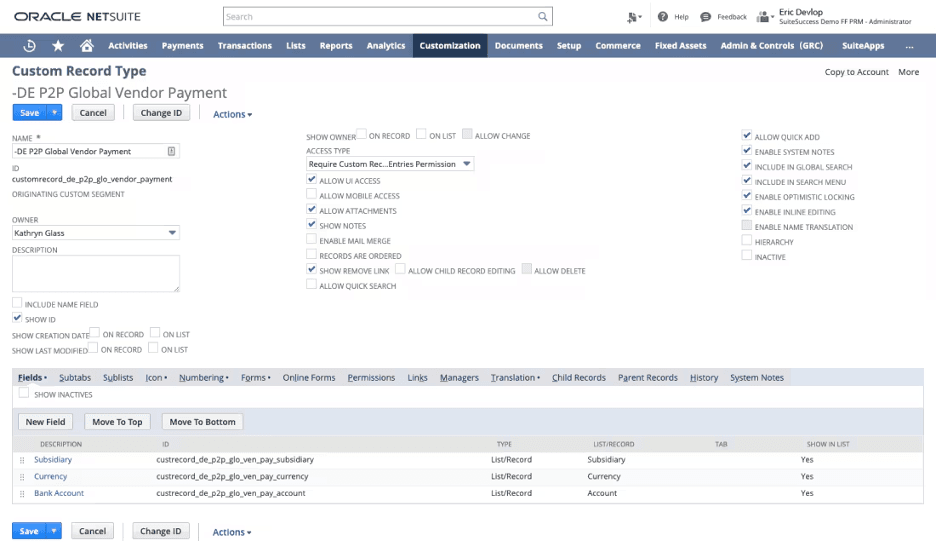
There are numerous CRM features to consider when choosing the right platform for your business. While NetSuite is not inherently a CRM system, its connection to the broader NetSuite cloud infrastructure means that it can offer significantly more than the core functionality found in many other CRMs we reviewed.
We were impressed by Oracle NetSuite’s ERP functionality. The customer sales journey doesn’t end once you’ve successfully converted leads to clients, which is why we appreciate that Oracle NetSuite CRM works in perfect harmony with the vendor’s ERP product. This integration allows users to manage the entire customer lifecycle — from lead acquisition to managing deals, issuing invoices, processing orders, tracking inventory, identifying upselling opportunities and providing post-purchase customer support. Very few CRMs offer this level of visibility into the entire customer journey.
We also like the financial and accounting features that come as part of the core ERP package, including the way the system automates invoicing, recurring billing and reminders for overdue payments. These features will be particularly useful for e-commerce businesses that need visibility into purchasing processes and detailed customer information without integrating external tools.
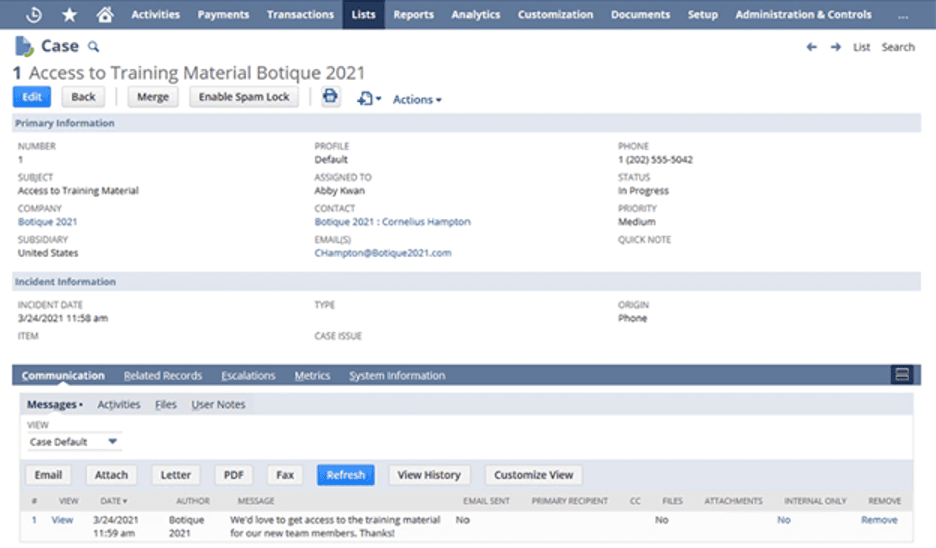
We were pleased to see the depth of NetSuite CRM’s sales-forecasting tools, which allow teams to get reliable data for informed business decisions.
Calculated forecasts examine customer data to determine close probabilities, weighted and projected opportunity amounts, and quotes using data not only in the sales pipeline, but also in the order records. You can use “mood ring” forecasts for general predictions that aren’t tied to a particular quote or opportunity and compare multiple forecasts to gauge the overall accuracy of predictions. Unlike many other CRMs we reviewed that fully rely on AI predictions, NetSuite also recognizes the value of professional experience and allows sales reps to make manual adjustments to generated forecasts through the Sales Rep Forecast Editor, ensuring that the final estimate accurately represents each opportunity.
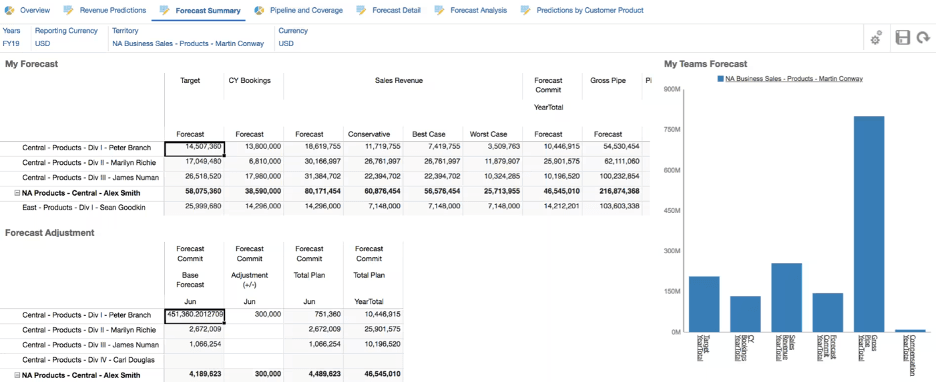
While many CRM platforms are adding CPQ functionality (read our Freshworks CRM review to see how this vendor incorporates CPQ features), we were impressed by NetSuite CRM’s CPQ execution and customization options. We also like that NetSuite CRM’s CPQ provides a guided selling feature that helps sales teams understand customers’ needs. Through a series of pre-configured questions, the system helps provide tailored recommendations, both improving customer experience and offering cross- and upselling opportunities.
We also appreciated that reps can benefit from real-time pricing. NetSuite CRM monitors all the costs that go into a quote, including shipping, labor and materials. If a cost changes, the system automatically updates the quote. The CRM can also cope with different pricing strategies, including volume discounts, promotional discounts and regional pricing differences.
Additionally, we like how the system handles contracts, subscriptions and renewals with its profit-based intelligent deal-management feature.
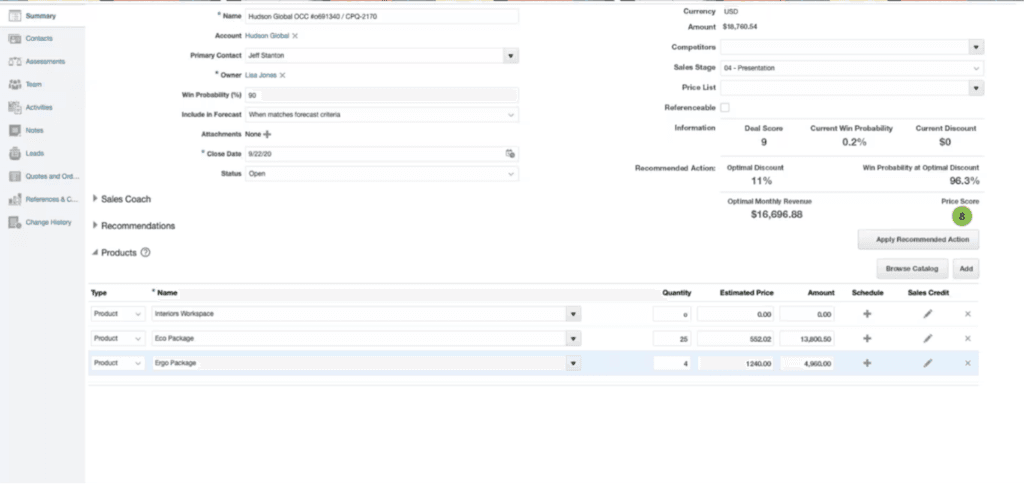
We were pleased to see that NetSuite CRM includes a built-in upsell manager. It analyzes buying patterns and other CRM metrics to suggest upselling and cross-selling opportunities, recommended items or categories. The system can also:
We particularly appreciated that NetSuite CRM embeds a dedicated upselling tab in a customer’s record, always keeping sales opportunities top of mind. As the old sales mantra goes, ABC (Always Be Closing).
We really like NetSuite CRM’s incentive program-management tools. You can measure your sales reps’ performance in various ways, such as by quotas, quantity sold, total sales, profitability or custom criteria. Use data analytics to forecast commission earnings, split commissions between agents, calculate commissions due to sales managers or executives, estimate referral bonuses and process payments – all without leaving the CRM environment. We also like that the system allows you to add incentives and one-time “spiffs” as part of commission plans, which is perfect for driving performance during low seasons.
We appreciate how the system manages payments to third parties like partners, resellers and vendors. For larger companies — where a high proportion of revenues comes from these sources — the commission-management function can streamline a complicated process. With the correct configuration, you may even be able to launch a self-billing program.
Another unique CRM feature we liked is NetSuite’s partner relationship management (PRM) program. It allows your business to get full visibility into your third-party partners’ sales and marketing activities, including joint marketing campaigns, lead management, sales forecasting, order processing and commissions, as well as taking care of the payment processing hurdles when a strategic partner is involved.
On joint advertising campaigns, the system allows all parties to see the same conversion data, providing important context for driving performance and ensuring solid return on investment.
We also like that the system allows partners and resellers to use a dedicated portal to place and track orders, without involving your sales team, while still providing you with full visibility. For greater transparency, you can give your partners PRM logins to track lead progress. This business transparency increases trust and reduces the workload on team members tasked with manual data entry or providing partners with frequent lead updates.
We also appreciate the way NetSuite CRM automatically handles partner commissions and royalties, offering transparent calculations and partner access, which helps reduce any miscommunication regarding due payments.
The PRM module works with all third-party partnerships. However, NetSuite has particular experience in providing solutions for manufacturing, software, services, advertising, media, publishing, nonprofit and wholesale distribution firms.
We were pleased to see that NetSuite offers mobile apps for iOS and Android to help field reps and remote workers enjoy many of the same productivity and employee collaboration features as on-site desktop users.
As the dashboards and data are automatically synced between devices, sales reps can easily access the latest contact records, update lead-scoring scorecards and review KPIs. They can check task reminders, view scheduled meetings, log calls and send quotes when away from their desktop. Unlike other CRMs we reviewed, the NetSuite CRM mobile app also allows employees to log expenses and manage receipts while on the go.
Users can also access a mobile browser version of the desktop app for additional functionality or use it offline to continue working without interruption, even without internet access.
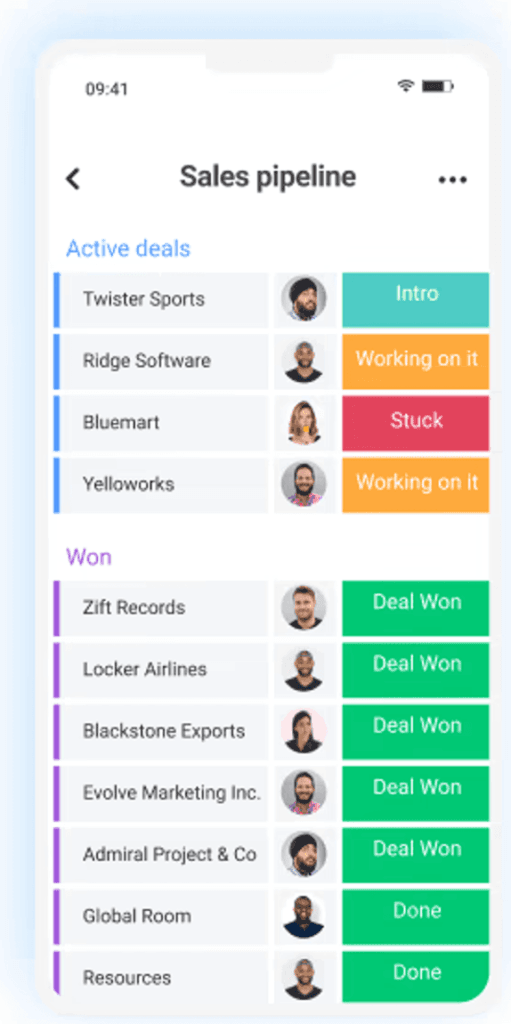
We found Oracle NetSuite CRM’s reporting and analytics features to be on par with those of its competitors. The platform monitors various metrics across sales, marketing and customer support teams, providing insights into the entirety of the customer lifecycle — from lead generation to order completion and accumulated revenue. Sales managers can review such important KPIs as acquired leads, won and lost opportunities, forecasted sales and lead conversion ratio. You can also zoom in on individual, team or territory performance and review predictive versus actual data for sales pipeline and sales funnel stages and quota fulfillment.
On the marketing side, the CRM provides insights into marketing campaign performance, covering various metrics like clickthrough rates, conversion rates, return on investment, lead generation by source, as well as website activity overview. We appreciated the number of customer support-related reports — something that is uncommon among competitors. The system allows service teams to review case volume, resolution times and rates, escalation patterns and monthly case trends, so they can identify areas for improvement and drive customer satisfaction.
You can also use NetSuite’s drag-and-drop Report Builder to create reports that perfectly match your criteria and business needs and then share them with your team. We also like that the CRM includes a Workbooks SuiteApp add-on that allows users to build more complex reports. However, while relatively straightforward, users with limited tech experience might find using the tool more challenging. That’s why we appreciated that the provider introduced an AI assistant that can retrieve information from

We were impressed by NetSuite’s self-service customer portal that can be easily integrated with the CRM platform. It gives customers 24/7 access to their order histories and allows them to place, amend and track the status of their orders, submit return requests and pay invoices — all without involving your sales or support teams. This helps accelerate the purchase process, reduce the risk of wrong orders and free your reps to focus on closing.
We also like that customers can visit your self-service knowledge management system to resolve issues or open a support ticket. They’ll automatically receive confirmation of the service request and a case number. This self-service option helps empower your customers, providing a better brand experience and building loyalty.
We appreciate how NetSuite has created separate customer portal versions for B2B and B2C e-commerce businesses. Both benefit from single-view customizability and connections; however, the B2C offering features social network integration, and the B2B version includes quoting and billing processes. Businesses that operate on both B2B and B2C markets can view all their customer data on one unified platform.
Unfortunately, Oracle does not openly display pricing information on its website; you must contact a sales representative for a custom quote. After the initial contact, a senior member of the team will reach out to you to learn more about your company’s needs and size, arrange a quick demo, and advise on the most fitting configuration and setup.
All subscribers will need to pay for the core NetSuite ERP platform, which includes a CRM module. Similar to other CRMs we reviewed, the number of users will influence the price, with the provider offering four main tiers: Standard (up to 100 users), Premium (up to 1,000 users), Enterprise (up to 2000 users) and Ultimate (up to 4000 users). However, each user will need a separate paid license, which also differs depending on their level of access.
Our research indicates that businesses can expect to pay more than $1,000 per month for the core platform, plus $149 per user. Connecting powerful add-ons like SuiteCommerce or advanced analytics will also require an additional investment, with most standard modules priced between $499 and $999 per month.
There is also a one-time implementation fee, which can cost anywhere between $10,000 and $100,000+, depending on your company’s size and the complexity of setup. All in all, we’re talking about a sizable amount that may be beyond the budget of some business owners. However, it’s still best to contact Oracle for a custom quote for the most accurate pricing.
This lack of pricing transparency is worth noting. Other vendors we evaluated were upfront about costs and different product tiers, although they don’t offer an all-encompassing business platform like NetSuite. For an example of a rival CRM with straightforward pricing, read our comparison of Pipedrive and Salesforce.
Since Oracle NetSuite is not a stand-alone CRM solution, the initial implementation is a heavier lift than other options on the market, particularly if you’re switching CRM systems. The exact steps depend on the overall combination of add-on modules and customizations you purchase with the ERP system, as well as your available team resources. Fortunately, the company offers several checklists and resources to assist with deployment.
While Oracle estimates that many companies can complete the setup process in as little as 30 days, our research indicates that small businesses will likely need a minimum of two months, while more complex CRM implementations can take over a year.
That is far longer than it takes to get up and running with most CRMs we reviewed, and the timeframe might not be feasible for a small business. However, a robust system like the Oracle NetSuite platform may be worth the time investment for mid-size companies and larger enterprises.
We were pleased with the responsiveness of NetSuite’s customer support. When we contacted Oracle for information about its CRM, we received immediate assistance, including a general overview of the product and associated services. After providing some basic contact information, we were paired with a sales representative based on our geographical area and business needs, who quickly reached out to schedule a call to provide more tailored information.
NetSuite also offers four tiers of subscription-based Advanced Customer Support services — Advise, Monitor, Optimize and Architect — providing various levels of configuration and implementation support, business guidance and performance monitoring.
Self-service customer support is available online, including subscription-based training with online webinars, on-demand learning courses and hands-on labs. While Oracle’s online support library is not as comprehensive as that of competitor Salesforce, it still provides a good amount of information to get you started and resolve basic queries. Check out our detailed Salesforce CRM review to further compare and contrast.
We appreciate that collaboration opportunities with Oracle’s Education Success Advisors allow you to develop personalized learning plans or schedule additional training guidance.
Oracle NetSuite CRM is a powerful solution. However, there are some limitations to be aware of:
When evaluating the top CRM software, we conducted extensive research comparing dozens of CRM platforms. Our product review process included customer support team communication, feature and functionality evaluations, pricing comparisons, and an examination of numerous tutorials, webinars and support materials. When looking for the best CRM with ERP capabilities specifically, we evaluated ERP functionality as well as contact, opportunity and account management. We also assessed financial management tools, workflow automation, reporting and analytics, customization options, available integrations, and the level of customer service.
We recommend Oracle NetSuite CRM for …
We don’t recommend Oracle NetSuite CRM for …
Nadia Reckmann contributed to the reporting and writing in this article.

